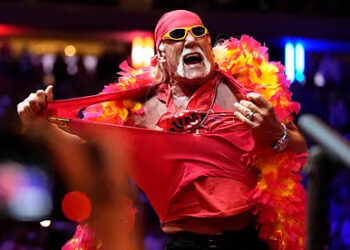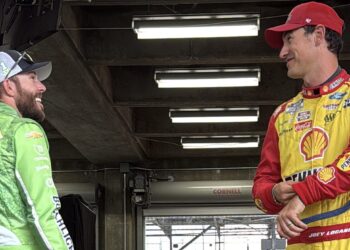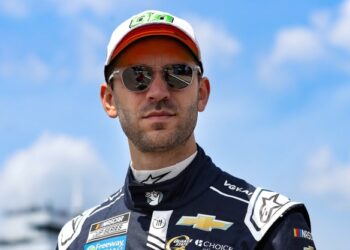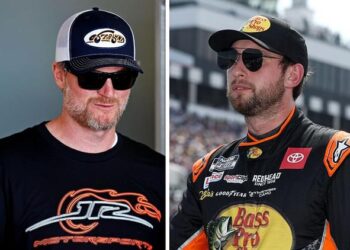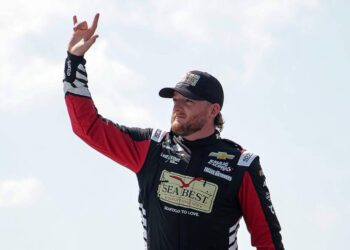In the high-octane world of NASCAR, controversy is never far behind. Every pass, every bump, and every decision made by officials is dissected by drivers, teams, and fans alike. This week, the decision to let Ty Gibbs off the hook after a controversial on-track incident has become the latest flashpoint. Yet, amid the heated debates, two respected voices — Todd Gordon and Kyle Petty — have stepped forward to defend NASCAR’s choice not to penalize the young driver, arguing that sometimes racing should be allowed to police itself.
The incident in question occurred during the final laps of last weekend’s Cup Series race. Gibbs, the 21-year-old rising star for Joe Gibbs Racing, made aggressive contact with another driver while battling for position. Some fans and analysts immediately called for NASCAR to issue a penalty, claiming Gibbs crossed the line between hard racing and reckless driving. However, NASCAR officials reviewed the situation and ruled it a racing incident — no penalty, no points deduction, no fines.
To some, that decision felt like NASCAR giving Gibbs, a polarizing figure who has already built a reputation for fiery competitiveness, a free pass. But for Todd Gordon, the former championship-winning crew chief and current NBC Sports analyst, NASCAR got it right. Speaking on his weekly radio show, Gordon explained, “If you start penalizing every bit of aggressive racing, you’re going to take the edge out of what makes this sport exciting. Ty’s move was aggressive, no doubt, but it wasn’t out of bounds. That’s the kind of racing fans pay to see.”
Kyle Petty, a former driver and another well-known analyst, echoed Gordon’s perspective. Petty knows a thing or two about the balancing act between aggression and respect on track. The son of NASCAR legend Richard Petty, Kyle has always advocated for drivers settling disputes among themselves rather than relying on officials to do it for them. “It’s part of the game,” Petty said during a segment on NASCAR America. “You put young drivers in high-pressure situations, and they’re going to push limits. Ty did that. Did it upset people? Sure. But that’s racing.”
Both Gordon and Petty believe that NASCAR’s decision aligns with its recent trend of letting drivers race with fewer restrictions. Over the years, NASCAR has faced criticism for sometimes stepping in too quickly with penalties that can appear inconsistent. By resisting the urge to micromanage every moment of contact, the governing body gives drivers room to build rivalries, develop their racecraft, and learn where the line truly is.
It’s no secret that Ty Gibbs has become one of the sport’s most talked-about young talents — and one of its most scrutinized. The grandson of legendary team owner Joe Gibbs, Ty has won races at every level on his way to the Cup Series. He’s also ruffled feathers along the way, drawing comparisons to other aggressive young stars like Kyle Busch in his early days. For many, this incident fits the narrative that Gibbs races with a chip on his shoulder and isn’t afraid to use his bumper to get what he wants.
But Gordon pointed out that every generation has drivers like Gibbs — and that the sport needs them. “People forget how polarizing guys like Dale Earnhardt were early on. You can’t have 40 drivers out there all being nice to each other. That’s not what built NASCAR. We need villains, we need heroes, we need storylines,” he said.
Petty agreed, adding that Gibbs will learn more from the pushback he’s getting in the garage than he ever would from a formal penalty. “You want to teach a young guy a lesson? Let the drivers handle it next week. If people think Ty stepped over the line, they’ll remind him on the track. That’s always been the code out here,” Petty said.
Of course, not everyone is satisfied. Some fans argue that consistency is key — if NASCAR penalizes one driver for a similar move but lets another slide, it breeds resentment and confusion. Others believe that young stars like Gibbs benefit unfairly from their name recognition and team connections.
But Gordon and Petty dismiss those claims, insisting that NASCAR’s biggest responsibility is to maintain the integrity and unpredictability of the racing product. They contend that the garage area, where drivers talk things out — or settle scores on the track — remains the best check-and-balance system.
As the season rolls on, all eyes will be on Ty Gibbs to see if he tempers his aggression or continues to lean into his role as a brash up-and-comer unafraid to ruffle feathers. For now, though, he has two influential allies in Gordon and Petty — and a clear message from NASCAR: race hard, but race fair.
In the end, that’s all any driver can ask for — and all the fans really want. After all, in NASCAR, a little controversy has always been part of the show.

